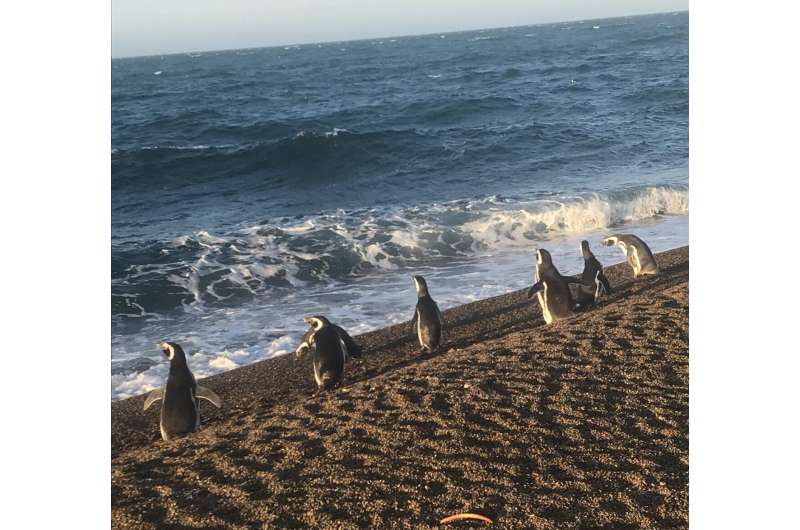Science
Magellanic Penguins Use Ocean Currents for Energy-Efficient Navigation

A recent study reveals that Magellanic penguins can effectively use ocean currents to conserve energy during their long journeys. Published on July 17, 2025, in the journal PLOS Biology, this research led by Richard Michael Gunner from the Max-Planck-Institut für Verhaltensbiologie in Germany, demonstrates how these penguins navigate efficiently without visual landmarks.
The study highlights the penguins’ ability to sense current drift, allowing them to alternate between a direct route in calm conditions and swimming with strong currents. This strategy helps them conserve energy while making their way back to their colonies to feed their chicks.
The Magellanic penguins undertake significant foraging trips, often traveling long distances across open ocean. To examine their navigation techniques and ability to adjust their routes based on current drift, researchers fitted 27 adult penguins from the San Lorenzo Magellanic penguin colony in Peninsula Valdés, Argentina, with GPS and inertial measurement unit (IMU) loggers. Each penguin’s foraging trip was recorded before the devices were removed.
Analysis of the movement data revealed that the penguins displayed a remarkable ability to adapt to varying current conditions. In calm waters, they maintained precise, direct routes toward their colony. In contrast, when faced with stronger currents, the penguins swam in the direction of the flow, which increased their travel distance but conserved energy. This suggests a significant level of awareness regarding current drift relative to their destination.
Despite the compelling findings, the study’s authors caution that the research is based on a limited sample size of a single trip for each penguin. Future investigations could replicate these results across different penguin populations and other marine species, aiming to elucidate the mechanisms by which these animals sense and respond to ocean currents.
According to the authors, “Our results indicate that penguins notice discrepancies between their intended path and actual displacement over ground, then adjust accordingly.” They pointed out that while penguins generally aim toward their colony in strong currents, they exhibit a broader heading distribution. This behavior may involve frequent minor adjustments to compensate for drift, showcasing their effective navigation skills even when far from land.
The study further emphasizes how Magellanic penguins navigate from the open ocean back to their nests. They adjust their headings to exploit prevailing tidal currents, balancing energy expenditure with opportunities for foraging along their journey. The authors noted, “Rather than swimming directly home, they drift laterally with the tides, following paths that reduce energy costs while maintaining remarkable accuracy.”
This research contributes significantly to the understanding of navigation in marine animals, revealing the sophisticated strategies employed by Magellanic penguins to thrive in their natural environment. As researchers continue to explore these behaviors, insights gained may enhance our comprehension of how various marine species adapt to changing oceanic conditions.
-

 Entertainment3 months ago
Entertainment3 months agoAnn Ming Reflects on ITV’s ‘I Fought the Law’ Drama
-

 Entertainment4 months ago
Entertainment4 months agoKate Garraway Sells £2 Million Home Amid Financial Struggles
-

 Health3 months ago
Health3 months agoKatie Price Faces New Health Concerns After Cancer Symptoms Resurface
-

 Entertainment3 months ago
Entertainment3 months agoCoronation Street’s Carl Webster Faces Trouble with New Affairs
-

 Entertainment2 weeks ago
Entertainment2 weeks agoCoronation Street Fans React as Todd Faces Heartbreaking Choice
-

 Entertainment3 months ago
Entertainment3 months agoWhere is Tinder Swindler Simon Leviev? Latest Updates Revealed
-

 World2 weeks ago
World2 weeks agoBailey Announces Heartbreaking Split from Rebecca After Reunion
-

 Entertainment4 months ago
Entertainment4 months agoMarkiplier Addresses AI Controversy During Livestream Response
-

 Science1 month ago
Science1 month agoBrian Cox Addresses Claims of Alien Probe in 3I/ATLAS Discovery
-

 Health5 months ago
Health5 months agoCarol Vorderman Reflects on Health Scare and Family Support
-

 Entertainment4 months ago
Entertainment4 months agoKim Cattrall Posts Cryptic Message After HBO’s Sequel Cancellation
-

 Entertainment3 months ago
Entertainment3 months agoOlivia Attwood Opens Up About Fallout with Former Best Friend



















